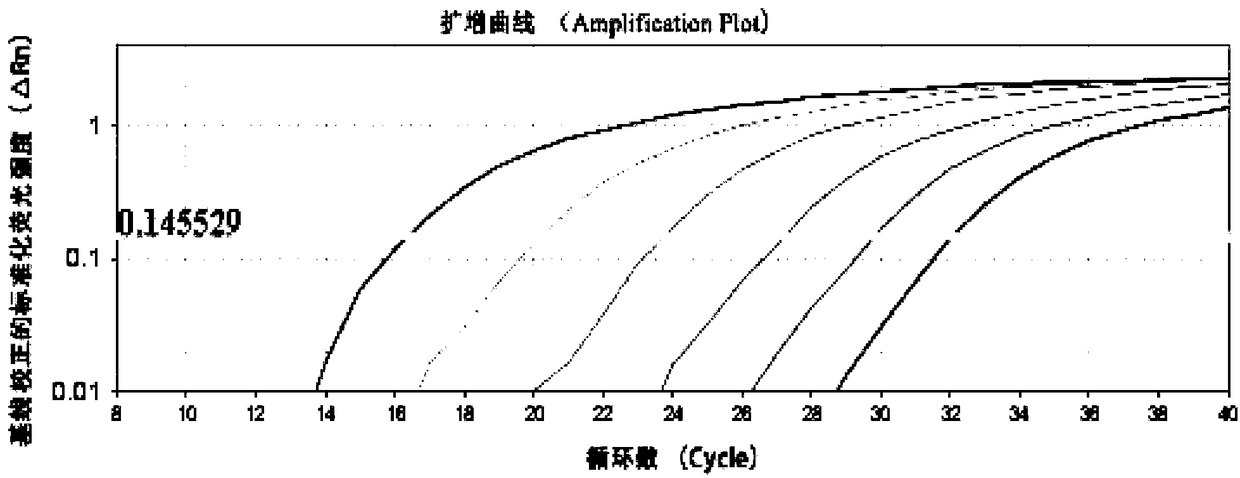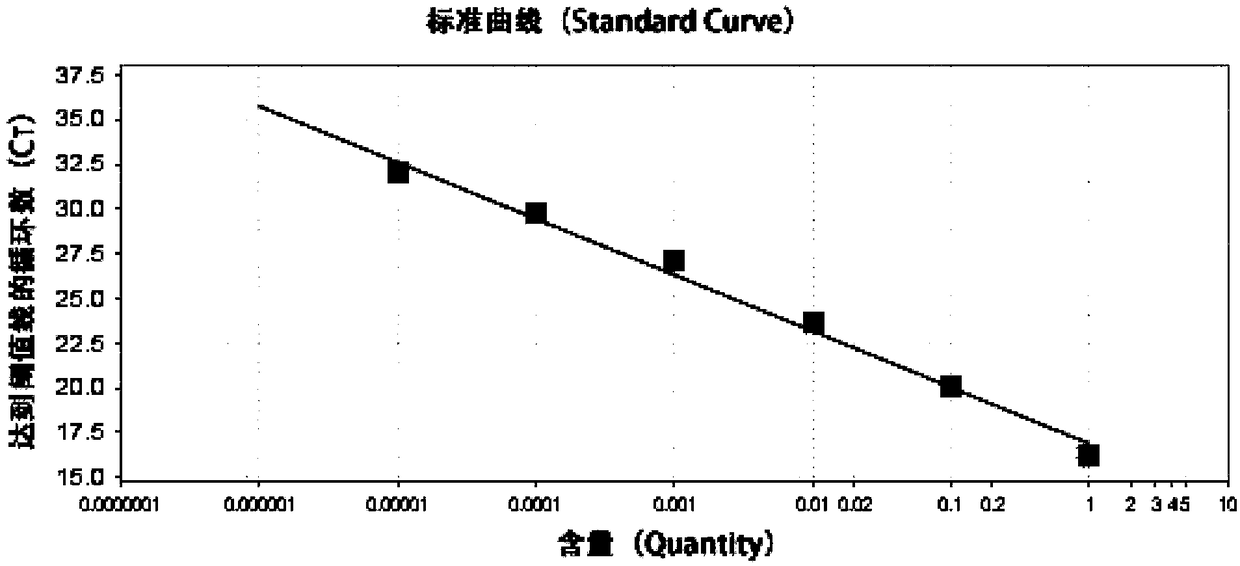Primer probe combination and fluorescence quantitative polymerase chain reaction (PCR) kit for simultaneous detection of three types of cryptococcus
A technology of primer probe and cryptococcus, applied in biochemical equipment and methods, microorganisms, recombinant DNA technology, etc., can solve difficult problems and achieve the effect of strong detection of specific type, high sensitivity and high stability
- Summary
- Abstract
- Description
- Claims
- Application Information
AI Technical Summary
Problems solved by technology
Method used
Image
Examples
Embodiment 1
[0068] Composition of the kit
[0069] 1. Primer design
[0070] According to the genomic DNA sequence of the ribosomal RNA of Cryptococcus neoformans, Cryptococcus gattii, and Cryptococcus lorentii, screen the target sequences and nucleotides of the target sequences that can universally detect these three cryptococci and are not homologous to other species The sequence is as follows:
[0071] (1) Cryptococcus neoformans target sequence (73bp):
[0072] AATGCGATAAGTAATGTGAATTGCAGAATTCAGTGAATCATCGAATCTTTGAACGCAACTTGCGCCCTTTGGT.
[0073] (2) Cryptococcus gattii target sequence (73bp):
[0074] AATGCGATAAGTAATGTGAATTGCAGAATTCAGTGAATCATCGAATCTTTGAACGCAACTTGCGCCCTTTGGT.
[0075] (3) Cryptococcus Laurentii target sequence (73bp):
[0076] AATGCGATAAGTAATGTGAATTGCAGAATTCAGTGAATCATCGAATCTTTGAACGCACCTTGCGCCTTTTGGT.
[0077] Aiming at the target sequences of Cryptococcus neoformans, Cryptococcus gattii and Cryptococcus laurentii, specific primers for the detection of these three c...
Embodiment 2
[0125] Detection method of the kit
[0126] Before using this kit for detection, it is necessary to extract the DNA of the sample to be tested. The sample to be tested can be cerebrospinal fluid, alveolar lavage fluid, sputum, secretions and other samples that may contain cryptococcus. The sample DNA can be extracted by conventional methods .
[0127] 1. Preparation of PCR reaction tubes (reagent preparation area)
[0128] (1) Determine the number of reaction tubes n (number of samples + negative control + positive control); take out sterilized purified water (prepared by the user) and PCR reaction solution; take out other components in the kit, put them on ice or Thaw at room temperature. All kit components require brief centrifugation before use. Each reaction system is shown in Table 2:
[0129] Table 2, composition of reaction system
[0130] PCR reaction solution
Primer
probe
Sterilized purified water
Sample / Control
total capacity
...
Embodiment 3
[0153] Performance evaluation of the kit
[0154] 1. Detection limit
[0155] 1) The dose-effect curve of this kit and the positive reference substance of Cryptococcus neoformans
[0156]Cryptococcus neoformans positive reference substance: different concentrations of Cryptococcus neoformans cloning plasmid AXc-T.
[0157] Using the kit of Example 1 of the present invention, according to the method of Example 2, the positive reference substance of Cryptococcus neoformans was detected.
[0158] Table 5. Detection limits of Cryptococcus neoformans
[0159]
[0160] The results are shown in Table 5, and the kit can be detected within the range of 1ng / μl-0.00001ng / μl.
[0161] 2) The dose-effect curve of this kit and the positive reference substance of Cryptococcus gattii
[0162] Cryptococcus gattii positive reference substance: different concentrations of cryptococcus gattii cloning plasmid AGc-T.
[0163] Using the kit of Example 1 of the present invention, according to...
PUM
| Property | Measurement | Unit |
|---|---|---|
| PCR efficiency | aaaaa | aaaaa |
Abstract
Description
Claims
Application Information
 Login to View More
Login to View More - R&D
- Intellectual Property
- Life Sciences
- Materials
- Tech Scout
- Unparalleled Data Quality
- Higher Quality Content
- 60% Fewer Hallucinations
Browse by: Latest US Patents, China's latest patents, Technical Efficacy Thesaurus, Application Domain, Technology Topic, Popular Technical Reports.
© 2025 PatSnap. All rights reserved.Legal|Privacy policy|Modern Slavery Act Transparency Statement|Sitemap|About US| Contact US: help@patsnap.com



